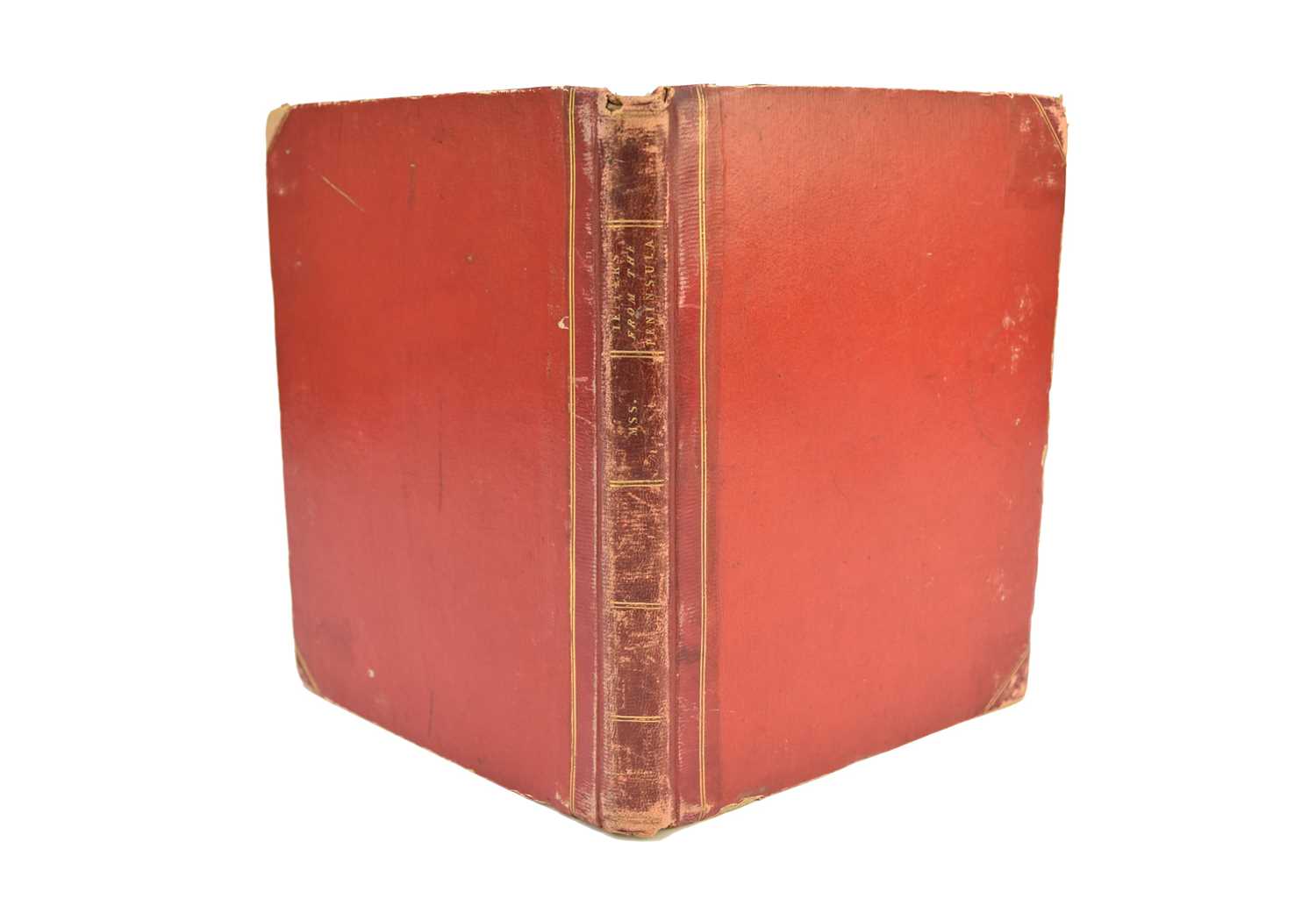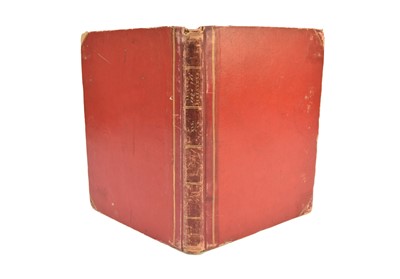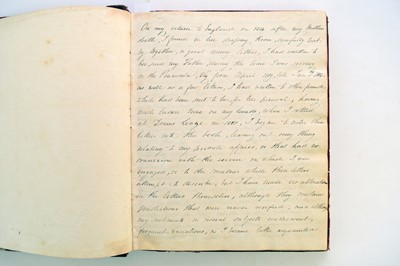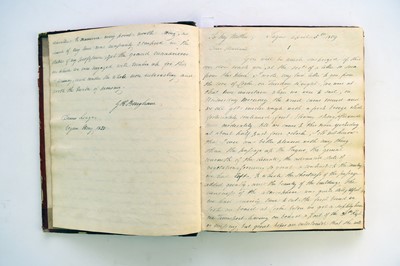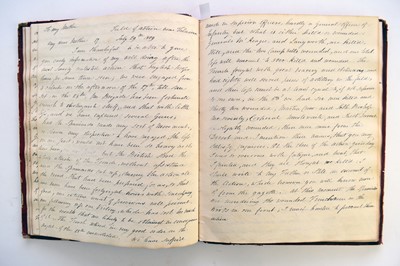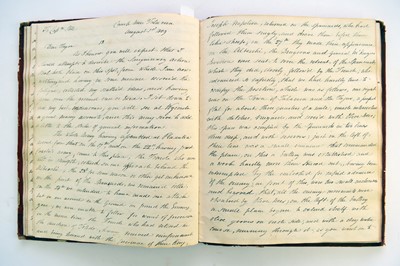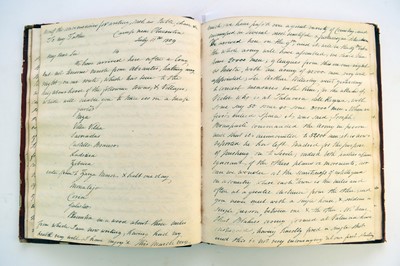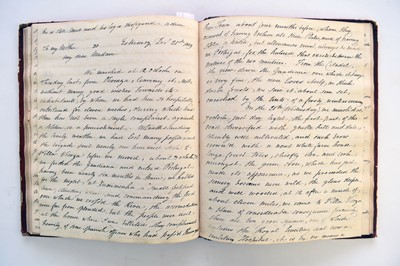12th Jan, 2022 10:00
Antiques, Interiors & Books Auction
PENINSULAR WAR MANUSCRIPT, April 1809 - March 1810
PENINSULAR WAR MANUSCRIPT. A detailed and important account of the Napoleonic War in the Iberian Peninsular between April 1809 and March 1810. 4to, 163 pages running to about 32,000 words. Written in a neat hand by Major-General Sir George Ridout Bingham (1777-1833) from letters written at the time, mainly to his mother. The book begins: ‘On my return to England in 1814 after my Mother’s death, I found in her dressing room, carefully put together, a great many letters I had written to her, and my father, during the time I was serving on the Peninsula, viz. from April 1809 till January 1814, as well as a few letters I had written to other friends, which had been sent to her, for her perusal; having much leisure time on my hands when I settled at Deans Leaze in 1820, I began to enter them into this book, leaving out anything relating to my private affairs, or that had no connection with the service on which I was engaged.’
‘The period contained in this book is one twelvemonth, from the beginning of April 1809, when we landed on the banks of the Tagus, to the end of March 1810; it embraces three very interesting points, viz. the campaign in the north of Portugal, with the expulsion of Marshal Soult from that country, and the rapid return of the army to Abrantes; the advance to Talavera, the sanguinary contest at that place, and the retreat of the army to the neighbourhood of Badajoz after it; and lastly the long winter march from the banks of the Guadiana to the northern frontiers of Portugal; in these marches we traversed (in a hasty manner to be sure) the greater part of Portugal and some miles in Spain and saw much of the country we passed through, and although we wanted the leisure and opportunity afforded ordinary travellers to examine every point worth seeing, as much of my time was necessarily occupied in the duties of my profession; yet the grand manoeuvres in which we were engaged will make up for this deficiency, and render the whole more interesting, and worth the trouble of perusing.’
To his mother, 29th July 1809, Field of Action near Talavera. ‘Had the Spaniards made any sort of movement, or shewn any disposition to have engaged, the loss on our part would not have been so heavy, but the British stood the whole attack of the French without assistance, and the Spaniards ate up, during the action, all the bread that had been prepared for us, so that our men have been fortyeight hours with scarce any food; our extreme want of provisions will prevent our following up our victory…We have suffered much in superior officers, hardly a general officer of infantry, but what is either killed or wounded; Generals McKenzie and Langworth are killed; Hill and the two Campbells are wounded, and our total loss will amount to 5000 killed and wounded. The French fought with great bravery and obstinacy and had eighty well served pieces of artillery in the field, and their loss must be at least equal to, if not superior to our own; in the 53rd we have had six men killed and thirty two wounded; Martin Crew and Seth Bishop are severely, Corporal Muslewaite and Jacob Durnet slightly wounded; these men came from the Dorset and I mention their names that you may satisfy enquiries. At the close of action yesterday I was so overcome with fatigue, and heat, that I fainted, and they all thought me killed… At this moment the Spaniards are murdering the wounded Frenchmen in the woods in our front; I must hasten to prevent them. Adieu.’
To Captain Tryon Still, August 1st 1809, Camp near Talavera. In a seven-page letter Bingham describes the terrain, the positions of the armies and the action. ‘On our right was the town of Talavera and the Tagus, a perfect flat for about three quarters of a mile, much intersected with ditches, vineyards, and covered with olive trees; this space was occupied by the Spaniards in two lines three deep, and with reserves; just on the left of their line was a small eminence that commanded the plain, on this a battery was established and a work hardly more than traced out, having been interrupted by the unlooked for rapid advance of the enemy; in front of this were two small enclosures, and beyond that, all the enemy’s movements were obscured by olive trees…about 7 o’clock the French appeared in full force on our left, and after a cannonade that lasted till sunset, as soon as it was dark, brought up their columns to charge; they had succeeded in getting possession of the hill, but the 2nd division coming up, drove them from it; this hill was the utmost consequence to us, it commanded and was in fact the key position, and we retained it against several attacks the enemy made on it. About ten o’clock the firing ceased for the night, which we passed under arms, occasionally entertained by a heavy fire from the Spanish line, which they kept up on being disturbed by the enemy’s patrols…The Spanish army is in so disorganised a state, the under officers such poltroons, the superior such traitors, I am afraid one day or other they will lead us into a scrape from which it will be difficult to extricate ourselves; we are now without a day’s provisions in advance, without magazines and (notwithstanding what you may hear in England) with a population very luke warm in our behalf; this ought to have been foreseen before we left Portugal, the whole day of the action our people were actually without provisions and we have been detained here ever since for want of it.’
Half red calf, red boards.
Major-General Sir George Ridout Bingham (1777-1833) was born into an old Dorset family. He enlisted in the 69th foot as an ensign in 1793 and by 1801 was a major in the 82nd foot, serving in Minorca. In 1805 he was appointed lieutenant-colonel of the 2nd battalion 53rd (Shropshire) regiment of foot in Ireland. He went to Portugal with the regiment in 1809 and fought at its head throughout its distinguished Peninsular War career, beginning with the expulsion of the French from Oporto. He served in the Peninsular from 1809 to 1814, and subsequently fought in Spain and the south of France, including the victory at Vitoria.
Bingham was awarded the Portuguese Order of the Tower and Sword and was knighted in 1815. In October of that year he accompanied Napoleon Bonaparte to St Helena, and was commanding officer on the island until 1819. He ended his career in Ireland where his skill and tact were put to great use in a very difficult situation. He was regarded by his fellow officers as a thorough gentleman and a brilliant soldier.
Sold for £7,000
